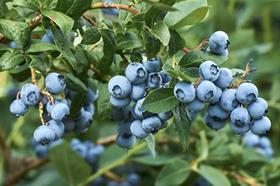
South African blueberry growers are stepping up their promotional drive in Germany by highlighting the quality and sustainability credentials of their fruit.
The country expects to ship some 3,000 tonnes to Germany this season, and while this only represents a small volume of the country’s exports to the EU, there are long-term ambitions to boost its share of the market.
Berries ZA highlighted how South Africa's advantageous location makes it an attractive option for retail buyers looking to source fruit with a lower air and sea footprint.
In addition, a number of sustainability initiatives taking place on farms mean South African blueberries are 'the ideal choice for the modern, conscious consumer'.
Blueberries have grown in popularity in recent years, with shoppers attracted to their taste, convenience and health qualities.
“There are amazing varieties coming out of South Africa,” said Elzette Schutte, manager for industry association Berries South Africa (Berries ZA). “They have good size, the quality is exceptional, and they have a beautifully sweet taste. The climate makes the fruit very consistent, so consumers get the same quality experience each time.”
South African exporters believe they have not fully tapped into the potential of the German market so far, but are looking to rectify that through trade media and digital and print advertising, highlighting South Africa’s 'beautiful fruit and outstanding taste credentials'.
The campaign will be visible throughout the season and in the run up to Fruit Logistica, where Berries ZA will be on hand to meet key industry contacts and develop new relationships.
This comes as a sustainability drive across South Africa’s blueberry farms addresses consumers’ desire for fruit produced in a socially and environmentally conscious manner.
Growers have signed up to the UN’s Sustainable Development Goals and a number of projects are taking place across farms, including the use of renewable energy, reforestation strategies, biodiversity growth, and the implementation of detailed waste-reduction and recycling programmes.
On the social side, a series of projects are taking place to enhance the lives of local farm communities.
These include the Ernita Sewing enterprise, which provides sanitary products for women and girls who do not have access to them; on-site nurses at 13 production facilities to help engender better physical and emotional wellbeing; support for schools through financial contributions and kitchen-building projects; and the OZblu Academy, which provides both in-person and online educational opportunities.
Many individual suppliers are pioneering their own projects as part of their commitments to social enterprise.
“We run projects on several farms in collaboration with retailers and the growers themselves, aimed at uplifting and supporting the communities from which the farm workers come,” explained Stefan Viljoen, sales manager at BerryWorld SA. “This includes building and maintaining creches, building a library, upgrading canteens and rest areas and supporting education and medical initiatives.”
These initiatives all tie into the overarching industry goal to produce quality products in harmony with the environment and its people.
“Sustainability is no longer about doing less harm, it’s about doing more good,” concluded Schutte. “These projects have a positive impact on the lives of people on the farm, as well as improving the environmental and social impact of the fruit that is grown.
'We know these issues are important to German consumers, who can be assured that when they buy and consume delicious South African blueberries that they are choosing fruit that have been produced with the utmost thought and care.”



